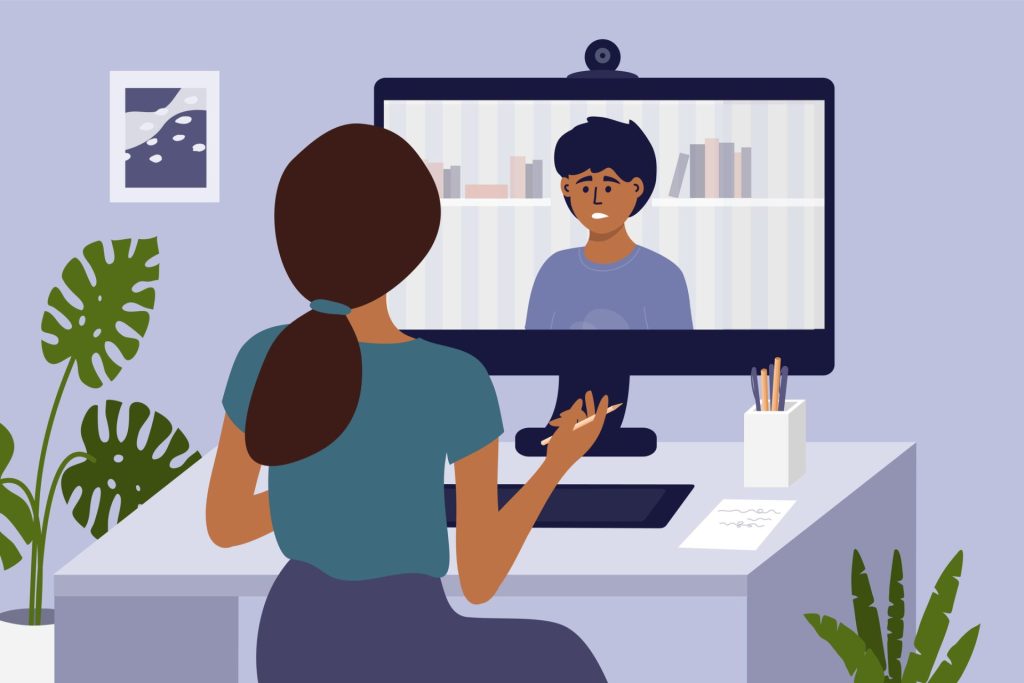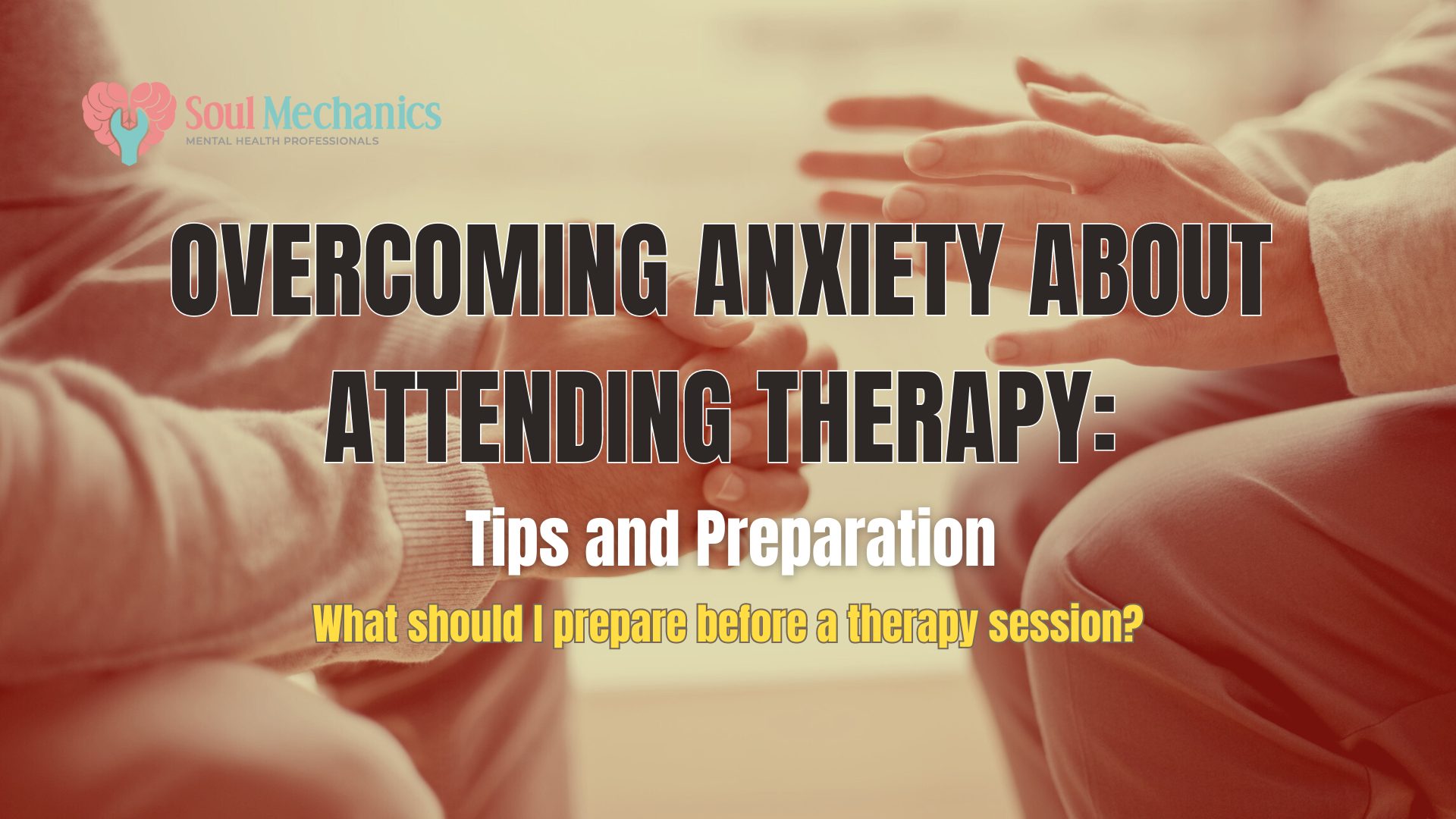Therapy Tips and Preparation: Overcoming Anxiety
Therapy Tips and Preparation: Overcoming Anxiety

Written By: Shaundtrya Ganasan, Licensed Counselor (KB11097)
I Want to Attend Therapy, but I Am Anxious About It—What Can I Do?

Research Therapists
Finding the right therapist is the heart of attending therapy sessions. Look for therapists who specialize in the areas you want to work on. Read their Google reviews, ask for recommendations from trusted ones, and consider the therapists' areas of expertise and qualifications. Knowing more about your therapist can help you ease some of your anxiousness by providing you with a sense of what to expect.
Reminder: If you or your loved ones are struggling with mental health conditions, please don't hesitate to reach out to us at Soul Mechanics KD or Soul Mechanics Ipoh. Remember, seeking help is not a sign of weakness but strength!
Understand Therapy
Educating yourself about what therapy is and what to expect can significantly reduce the fear of uncertainty. Educate yourself about different therapeutic approaches. Having the perspective that therapy is a collaborative process where you work along with your therapist to heal and achieve your goals can make the experience feel less nerve-wracking.
Initial Consultation
You can also start with the first therapy consultation with your preferred therapist. This is an excellent opportunity to explore, discuss your concerns, ask questions and find whether the therapist’s style suits you. Use this chance to gauge your comfort level with the therapist and determine if the therapist would be a good fit for you.
Write Down Your Concerns
Before your first session, you can write down your concerns and worries regarding therapy. Sharing these concerns with your therapist can help address them in the beginning. It also accommodates a starting point for open and transparent communication and allows your therapist to tailor their approach based on your needs and concerns.

Set Realistic Expectations
Therapy is a process, and progress is gradual, varying in pace and frequency. Setting realistic expectations can lessen the pressure of expecting immediate outcomes and healing. Understand that therapy is a process that involves ups and downs and that it’s okay to take small little steps towards your healing.
Practice Relaxation Techniques
Engage in relaxation activities like deep breathing, meditation, or mindfulness exercises before your first session. This can help you to calm your nerves. These exercises can help you to enter the therapy session with a more relaxed, clearer, and focused mind.
Bring a Support Person
If allowed, bringing a loved one to your first session to wait while you attend therapy sessions can provide emotional support. Having someone familiar and trusted with you can make the experience less overwhelming and intimidating. It also helps you to feel more comfortable.
Focus on the Benefits
Remind yourself of the potential positive outcomes you would experience from therapy, such as healing, improved mental health, healthier coping strategies, and a deeper understanding of yourself. Focusing on these benefits can further motivate you to ease your anxiousness.
Start with Teletherapy

If meeting your therapist in person feels too overwhelming for you, consider starting with virtual therapy sessions. Teletherapy can be a comforting first step to ease your anxiousness as well, allowing you to start therapy from your preferred safe and familiar.
What Should I Prepare Before a Therapy Session?
Some initial preparation before sessions can enhance your therapy experience and ease your nervousness. Here are some tips on what to prepare before attending your first therapy session:
Goals for Therapy
Explore what you want to achieve through therapy. Having clear goals can navigate your sessions better and help your therapist understand your personal needs. Whether you’re seeking therapy to manage anxiousness, discover yourself, improve relationships, or enhance personal growth. These defined goals provide you and your therapist with a sense of direction.
Personal History
Be open to discussing your personal history, including significant life incidents, relationships, and past events relevant to your current concerns. Your therapist needs to dive into this context to understand the underlying and tailor their approach more specifically.
Current Issues
Address specific concerns or symptoms that are troubling you. Note any significant or subtle patterns, triggers, or changes in your life. Providing more detailed information about your current obstacles helps your therapist develop a more personalized treatment plan based on your concerns.
Reminder: If you or your loved ones are struggling with mental health conditions, please don't hesitate to reach out to us at Soul Mechanics KD or Soul Mechanics Ipoh. Remember, seeking help is not a sign of weakness but strength!
Medical History
Note information about your medical history, which includes any medications you are currently taking and any previous diagnosis of mental health or treatments. You can also provide some family mental health history if needed. This information is essential for your therapist to understand your overall mental health better and explore any factors that might influence your current mental well-being.

Questions for Your Therapist
If needed prepare a list of questions you want to clarify about the therapy process, the therapist’s approach, and what to expect from the therapeutic sessions. Asking questions can enlighten uncertainties and foster you to feel more informed and at ease about the therapy sessions.
Self-Reflection
Spare some time to reflect on your thoughts and emotions before the session. Journaling or talking with someone you trust can help you organize your thoughts and provide better clarity on your emotional state. This reflection lets you address what you want to discuss and explore as a priority during the session.
Open Mindset
Attend therapy sessions with an open and non-judgmental mindset. Being open to diving into different perspectives can further foster the therapeutic process effectively. Remember that therapy is a safe and comfortable space for self-discovery, shedding unhealthy patterns, and growth.
Logistics
Ensure you are aware of the logistics of your appointment, which includes the time, location, platform if it’s virtual, and any necessary forms to fill out before the session. Being prepared can lessen your last-minute anxiousness or stress and allow you to focus better in the session.
Comfort Items

Bring any items that make you feel safe and comforting, such as a plush doll, water, or stress-relief items like a stress ball or fidget. Having these comfort items can provide a sense of familiarity during the session.
Emergency Contacts
Have a few emergency contacts and any relevant information regarding your trusted support. This can be beneficial during any moment of emergency.
Conclusion
Attending therapy can be the first step towards your journey of healing and personal growth. While it’s okay to feel initial anxiousness to start your therapy sessions, having some basic preparations can help you to reduce some of that anxiousness. By researching suitable therapists, understanding how the therapy process works, and preparing for your therapy sessions, you can make the most of your healing journey. Remember, therapy is a collaborative effort along with your picked therapist, and being open and transparent with your therapist is the heart of achieving your desired goals. It is okay to take it one step at a time.
If you’re looking for a therapist in Kota Damansara or Ipoh area, you can click here for more information.
If you enjoyed reading this, why not broaden the horizon of knowledge by learning about "Therapy; Ready for a Life-Changing Journey?"? You can read the blog here.
For more content related to mental health do follow us on our official Instagram.

